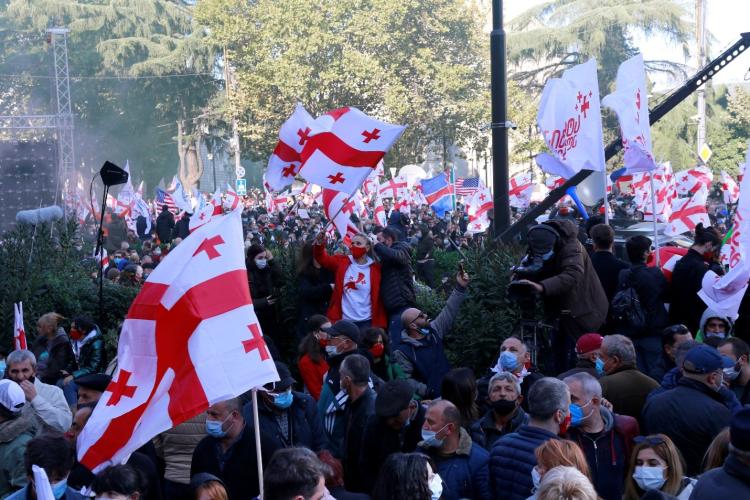
On April 29, the Parliament adopted amemendments to the Code of administrative offences introducing stricter sanctions on petty hooliganism and police disobedience, and prolonging administrative detention - charges most frequently used against protestors.
Amendments to the law took effect in an accelerated manner, with low participation of opposition parties despite criticism from CSOs. Human rights defenders think that the Code adopted during Soviet times must be completely overhauled. The provisions now tightened up are most frequently used in charges against participants of demonstrations during detentions, and will have an intimidating impact on freedom of expression and protest movements. Furthermore, the lack of comprehensive consultation with opposition parties, civil society and other stakeholders questions the purpose of these amendments.
According to the law of Georgia, the administrative offence is considered less severe by its nature compared to offences of criminal law. However, as a result of the adopted amendments sanctions have now increased equaling those for the offences under criminal law.
The amendments are the following:
-
If a person charged with an administrative penalty repeats the same administrative offence, the person will be imposed either a fine ranging from GEL 1500 to GEL 2000 (400 – 530 EUR) or an administrative detention for from 5 to 15 days for committing petty hooliganism. Whereas, according to the previous law, either a fine ranging from GEL 500 to GEL 1000 (133 – 265 EUR) or an administrative detention for up to 15 days was imposed, which meant that detention could last for less than 5 days. With the adoption of the new amendments, this now becomes impossible. In addition, counting the frequency of offences is also a novelty of the new amendments.
-
During an administrative detention, an arrested person appears before a court upon the first possibility but within no later than 24 hours. Before that, this article was formulated as follows: administrative detention must not have lasted for more than 12 hours, however, during detentions taking place on non-working days, the detention must not have lasted for more than 48 hours in total. Instead of decreasing a 12-hour detention period for those individuals whose detention period expires on non-working days, the detention period has now increased for up to 24 hours for any case. In addition, for obtaining a proof, the period can be once prolonged for no more than 24 hours, which means that a person can be detained for 48 hours in total. This approach unequivocally deteriorates the rights of citizens, especially considering the absence of effective legal mechanism for verifying lawfulness of administrative detentions. At the same time, the act of taking a 48-hour detention measure is an intensive and disproportionate interference with a person’s civil liberties.
-
In case of one-time disobedience to the lawful order or request of a law enforcement officer and other representatives of respective governmental organs during the performance of official duties, or in case of verbal abuse of this person and/or any one-time offensive action, a person will be imposed a fine ranging from GEL 2000 to GEL 3000 (530 – 800 EUR) or an administrative detention for up to 15 days. In case of repeating the mentioned action, a person will be imposed a fine ranging from GEL 3500 to GEL 4500 (940 – 1196 EUR) or an administrative detention for from 7 to 15 days. Earlier, the fine ranging from GEL 1000 to 4000 (265 to 1063 EUR) or up to 15-day administrative detention had been imposed, which automatically implied that the detention would last less than 7 days. In addition, the adopted amendments have now deprived the judge of the right to refuse imposition of an administrative penalty and use only a verbal reprimand.
In practice, these articles are most frequently used during demonstrations and manifestations: law enforcement officers often arrest demonstrators on the ground of violation of these articles for avoiding and localizing threats. According to activists, with these amendments the sanctions imposed for realizing the right of speech and expression have further toughened. Civil society in Georgia for years has been actively calling for fundamental reforms of Code of administrative offences. However, instead of taking steps towards reforms, the government extensively uses repressive laws against citizens and has now toughened liabilities imposed by the Code. The amendments further worsen the standards for peaceful gatherings in the country, and create solid barrier for freedom of expression.
Photo by Giorgi Gogatishvili
